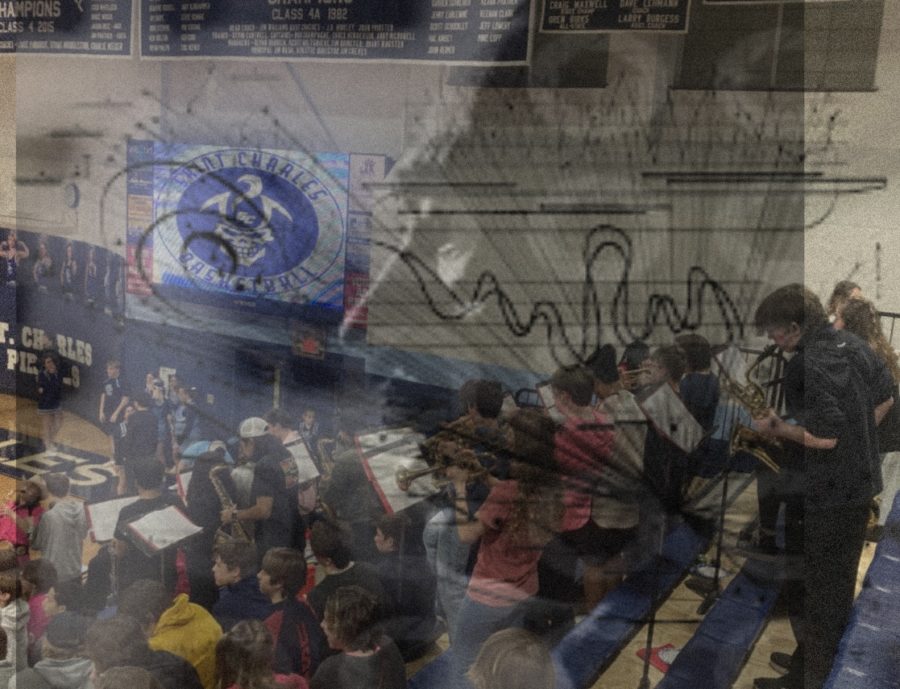Cutting Contest to the Tune of Education
SCHS band to join roster of bands at Essentially Ellington festival at UMSL
The Essentially Ellington Festival at the UMSL Touhill Performing Arts Center so happens to coincide alongside the path of our own Jazz Band who will be partaking this Feb. 9. The goal of the festival itself is to hone the skills of the band and unify the common interest of purveyors of jazz. The greater sentiment paying homage to Duke Ellington as the prerequisites to join the festival are to play a tune from the extensive repertoire of Ellington’s catalog.
“The song that the band will being in February will be Rockabye Baby by Duke Ellington it’s not one of his more known tunes, but it is one of his tunes that fits the time period and style of the them very well,” Ryan Blankenship, band director at St. Charles High said.
There are three songs that the band will be playing and notably among them being Asland’s Tale by Chris Berg will also be included in the set list. The styles that encompass the pursuits of Jazz going underway range from what Blankenship refers to as the Chuck Mangione area of discipline and Jazz Fusion sensibilities that the band has as of lately been practicing tantrically. To corroborate this practicing there is, courtesy of an attribution of lead alto Caleb Mertz, been a larger saxophone section than in years past to most likely staunch loose ends and thread a tighter sound to show up in the mix.
“We have a bigger saxophone section this year, a lot of our tunes feature a good amount of saxophones and I think that it helps show our strengths and weaknesses throughout the entire band,” Mertz said.
The band will be working within this framework of a worthy distribution of their sonic assets but will also have emphasis firmly placed on the salience of education. To address this underpinning of the festival there will be clinics under the tutelage of proctors to oversee the fine tuning of the bands themselves. The clinics are viewed as a worthy addition according to the attendants of the festival themselves as it resonates with their desire to lock down constructive criticism for chops they may not have even known they had or have been mostly tone deaf to even hear before without a different perspective offering guidance.
“They give you a 30 minute clinic, give you a suggestion of things that you can do to better adapt to that style of music. So it’s basically like having professionals come in and help you understand and sometimes for the kids it just takes the same thing being said coming from a different mouth,” Blankenship said.
For a festival such as Essentially Ellington, there is not an inkling of competitive consternation that offers any impetus for a make or break situation and output is more open to the floor. The potential for abasement is ruled out entirely and education and the substantive content of music to be played takes precedence. The distinction of competitive as opposed to non-competitive is drawn by the purpose of participation.
“So in a competitive setting you always have that thought in the back of your mind that you’re trying to do your best and you’re just trying to feel out how the band’s doing and how you can improve it or help make the band better. In a more laid back scenario, you’re kind of out there to have fun,” Mertz said.
Which is why the priorities on the styles have had room for the band to workshop and diversify their preexisting arsenal with the intersplicing of new material epitomized in the setlist.
“We’ve hit a lot of new styles that we don’t usually hit in Jazz band and it’s definitely been a challenge for us in jazz band. Myself personally I haven’t necessarily been experienced with all of the styles that we’ve doing but I’ve had to learn a lot this year and I’ve also had to teach some of the drummers a lot of the styles as well which isn’t necessarily a bad thing but it’s definitely been a struggle so far,” Eddie Page, band student said.
For a more concrete visualization and familiarity, the styles themselves in their trenchancy have been identified for how they will serve the education of band students alike. “Becoming familiar with the form of the tunes and what makes each style so important. Each style has a precipice that its built on. Like Baroque music is about repeating the sections and adding them louder and louder and louder or taking voices away to make them quieter. That’s baroque music but in the jazz section when you’re talking about swing you’re talking about Latin that deals with shuffles. Like what is the difference between a shuffle and a swing,” Blankenship said.
This gauntlet of new material to be absorbed is pressing and a priority to those with the desire to imbue their time in band with meaningfulness as well as the desire to hone in on the benisons of their formative fledging period as musicians for St. Charles High. Education is being serviced simply by the practice of the craft. Expansion of this factor and the band itself contributes to the camaraderie aspect of the craft to come around full circle.
“It is fun being in a place where you know everyone else loves jazz music and really just wants to play jazz music so it’s nice just to be around that,” Mertz said.



